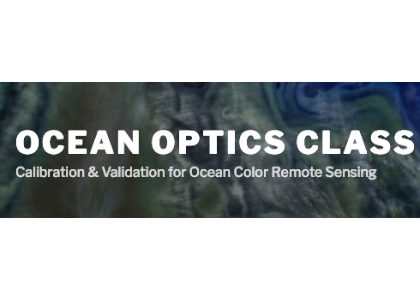Ocean Optics Summer Class Calibration and Validation of Ocean Color Remote Sensing
Dates: June 3 – June 28, 2019
Instructors: Emmanuel Boss (coordinator), Ivona Cetinic, Curt Mobley, Collin Roesler, Ken Voss, and Jeremy Werdell.
An intensive four-week, cross-disciplinary, graduate-level course in Optical Oceanography at the University of Maine’s Ira C. Darling Marine Center in summer 2019.
This class is a continuation of the Optical Oceanography course first offered at the Friday Harbor Laboratories in 1985 and since 2001 at the Darling Marine Center. Past graduates are many of today’s leaders in oceanography.
The major theme of the course is calibration and validation of ocean color remote sensing. The course will provide students with a fundamental knowledge of ocean optics and optical sensor technology that will enable them to make quality measurements, be able to assess the uncertainties associated with the measurements, and compare these data with remotely sensed ocean color measurements and derived products.
The course is sponsored by NASA and the University of Maine, with the goal of preparing a new generation of oceanographers trained in the use of optics to study the oceans.
Course elements include:
- lectures on the basic theory of the light interaction with matter in aquatic environments ocean color remote sensing and its inversion; optical sensor design and function ocean biogeochemistry; computation and propagation of measurement uncertainties
- laboratory sessions using optical instrumentation and radiative transfer software
- field sampling of optical and biogeochemical variables in the environmentally diverse waters of coastal Maine
- analysis of optical and biogeochemical data sets
- collaborative student projects
See: https://sites.google.com/site/oceanopticsclass/ and http://misclab.umeoce.maine.edu/OceanOpticsClass2017/ for previous class content and activities.
Costs: University of Maine tuition, room and board will be covered through a grant for qualified participants.
Registration: Apply by 10th of March 2019, with notification by 1st of April 2019. Application
Acceptance criteria: Likely impact of the class on the individual’s career, transcripts, letter from the academic advisor/supervisor, and diversity. Twenty students will be accepted. While the majority of the class will likely be composed of early career graduate students, advanced graduate students and post-doctoral fellows will be considered for admission.
For more information about the Ira C. Darling Marine Center, see: http://dmc.umaine.edu





